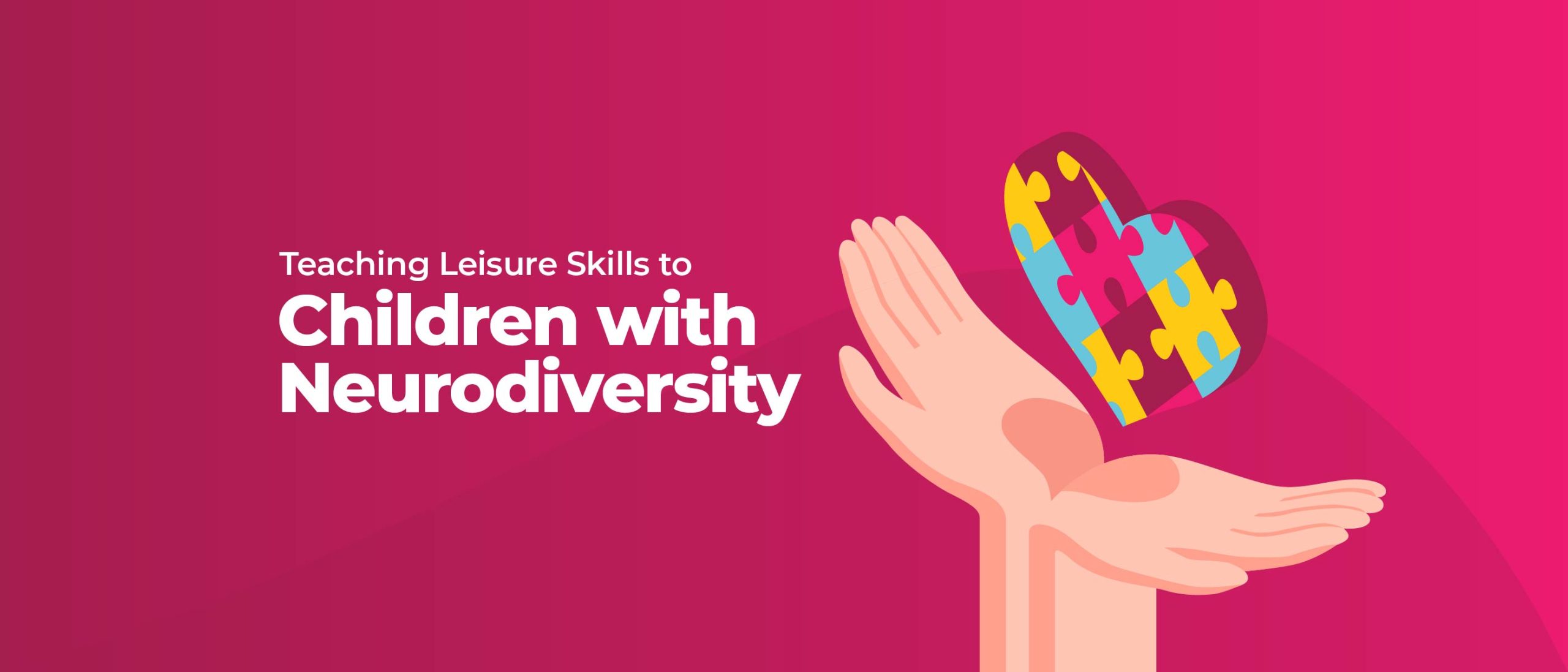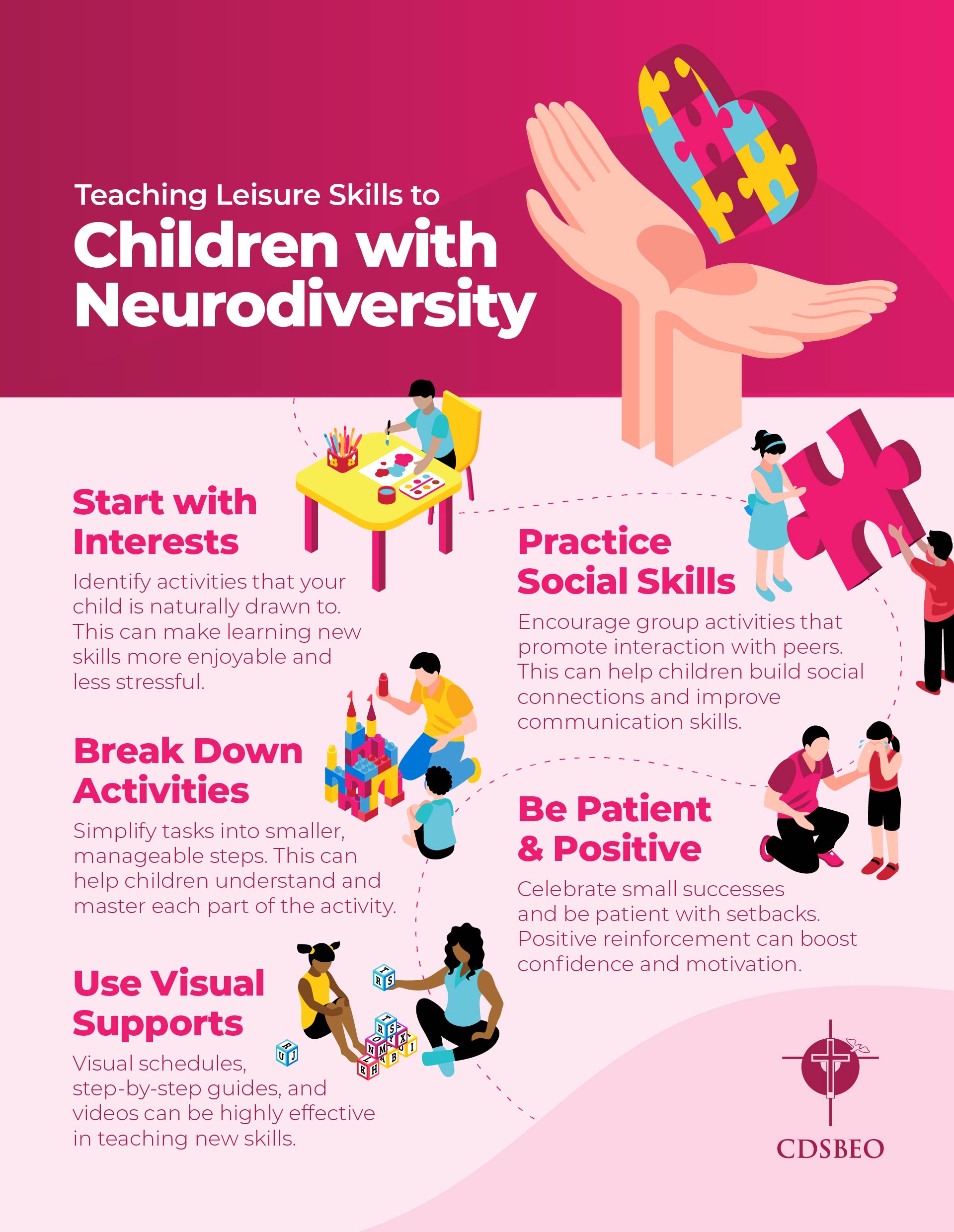Teaching Leisure Skills to Children with Neurodiversity

Leisure is time that is free from obligations and a means to relax and do things that you enjoy. Teaching leisure skills to children is essential for their overall well-being and parents and caregivers can help their child lead a more balanced and fulfilling life by teaching leisure skills. With patience, creativity, and the right support, children can discover activities that bring them joy and relaxation.
Tips on Teaching Leisure Skills
- Start with Interests: Identify activities that your child is naturally drawn to. This can make learning new skills more enjoyable and less stressful.
- Break Down Activities: Simplify tasks into smaller, manageable steps. This can help children understand and master each part of the activity.
- Use Visual Supports: Visual schedules, step-by-step guides, and videos can be highly effective in teaching new skills.
- Practice Social Skills: Encourage group activities that promote interaction with peers. This can help children build social connections and improve communication skills.
- Be Patient and Positive: Celebrate small successes and be patient with setbacks. Positive reinforcement can boost confidence and motivation.
Teaching Leisure Skills Promotes Independence
When children learn to engage in activities on their own, it not only boosts their self-confidence but also fosters a sense of autonomy. Here are examples of how leisure skills can promote independence:
- Creative Activities: Learning to draw, paint, or engage in other arts and crafts can provide a sense of accomplishment and allow children to express themselves independently.
- Physical Activities: Activities like swimming, biking, or playing on a playground can help children develop physical skills.
- Technology-Based Activities: Using educational apps or playing video games can be both fun and educational, helping children develop critical thinking skills and digital literacy.
- Reading and Storytelling: Encouraging a love for books can provide a lifelong source of enjoyment and learning, allowing children to explore new worlds independently.
By supporting children in these activities, you help them build the skills they need to navigate various aspects of life with greater confidence and independence.
Leisure Skills Can Help Build Social Connections
Leisure activities are fantastic for building social connections. Here are ways these activities can foster social skills:
- Team Sports: Participating in sports like soccer, basketball, or baseball can teach children about teamwork, communication, and sportsmanship.
- Group Games: Games like “Simon Says,” “Duck, Duck, Goose,” or board games can help children learn to follow rules, take turns, and interact with peers in a structured setting.
- Clubs and Groups: Joining clubs based on interests such as a Lego club, art class, or music group, can provide a shared space for children to bond over common hobbies.
- Playdates: Organizing playdates with peers can create a comfortable environment for children to practice social skills in a more relaxed setting.
These activities not only help children build friendships but also enhance their ability to cooperate, communicate, and understand social cues. By encouraging participation in leisure activities, you can support their social development and overall well-being.
Reducing Stress Through Leisure Activities
Leisure activities can be incredibly effective for stress relief. Here are some relaxing activities that can help manage stress:
- Mindfulness and Yoga: Simple yoga poses, and mindfulness exercises can help children relax and focus on the present moment.
- Sensory Play: Activities like playing with kinetic sand, water beads, or sensory bins can be soothing and help children regulate their emotions.
- Nature Walks: Spending time outdoors and exploring nature can be calming and provide a break from indoor environments.
- Art and Craft: Engaging in creative activities like painting, coloring, or crafting can be a great way to express emotions and reduce anxiety.
- Reading: Finding a quiet spot to read a favorite book can be a comforting and enjoyable way to unwind.
By incorporating these activities into their routine, children can develop healthy coping mechanisms to manage stress and improve their overall emotional well-being.

Community Resources
- Ability Online: Social media technology platform for young people with disabilities to connect with each other and the world around them. abilityonline.org
- Autism Ontario – Children and Youth Programs | Autism Ontario
- Children’s Hospital of Eastern Ontario (CHEO) – Recreation therapy – CHEO
- Community Living Ontario is a non-profit, provincial confederation that advocates for people who have an intellectual disability to be fully included in all aspects of community life. communitylivingontario.ca
- eMental Health.ca – Autism and Autism Spectrum Disorders : Ottawa-Carleton, ON : Mental Health Services, Help and Support : eMentalHealth.ca
- Health Services for Champlain: Local health services for Prescott, Russell, Stormont, Dundas, Glengarry, North Lanark, and North Grenville. champlainhealthline.ca
- Maltby Centre: Provides mental health and autism services. https://maltbycentre.ca/
- Ottawa Directory of ASD Services (Facebook) Ottawa Directory of ASD Services
- Quick Start Programs – Sports & Activities
- Valois Events and Groups – Events and Groups – Valoris
References
- CIRCLE CITY ABA https://circlecityaba.com/teaching-leisure-skills-to-children-with-autism/
- ONTABA ONTABA-Evidence-Based-Practices-for-Individuals-with-Autism-Spectrum-Disorders-Caregiver-Brief-Report.pdf
- VANDERBELT KENNEDY CENTER Teaching Leisure Skills in the Classroom: Evidence-Based Strategies to Encourage Participation
